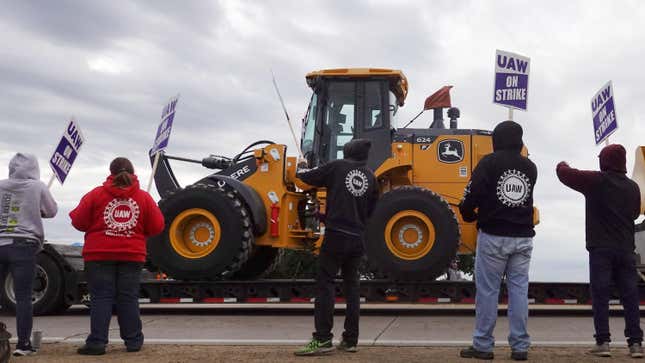
Over 10,000 John Deere workers spread out across 14 locations have ended a nearly five-week-long strike after ratifying what the United Auto Workers Union is calling a “landmark agreement.”
That agreement, which workers voted in favor of 61% to 39%, was the third proposal offered in less than two months and will provide a 20% increase in wages over the course of the six-year contract. John Deere workers will also receive an $8,500 signing bonus and enhanced retirement options.
“The sacrifice and solidarity displayed by our John Deere members combined with the determination of their negotiators made this accomplishment possible,” Chuck Browning, Vice President of the UAW and Director of the UAW Agricultural Implement department wrote in a statement. “They have started a movement for workers in this country by what was achieved here today and they have earned the admiration and respect of all that strive for what is just and equitable in the workplace.”
The strike occurred in the context of soaring record profits for John Deere. Earlier this year, the company reported it had earned more in the first nine months of 2021 than it had in the entire fiscal year for 2013. These record profits, mixed with a historic labor shortage, exasperation over hazardous Covid-19 working conditions, and worsening supply chain and component shortages affecting everything from tractors to computers, likely gave the striking workers added leverage.
“Through our new collective bargaining agreements, we’re giving employees the opportunity to earn wages and benefits that are the best in our industries and are groundbreaking in many ways,” John Deere Chairman and CEO John C. May said in a statement. “We have faith that, in return, our employees will find new and better ways to improve our competitiveness and transform the way our customers do their work.”
The historic John Deere worker strike started taking shape in early October after overwhelming voting against a six-year bargaining agreement. That agreement would have slightly increased pay (though lower than what many workers found acceptable) and retirement benefits but would have ended the company’s pension program for new fires brought on after November 1, according to the Des Moines Register.
One of the workers who voted against the agreement, a welder named Marty Carter, said he did so to preserve quality jobs for future generations.
“[John Deer] used to be the best place to work. It isn’t anymore,” Carter told the Des Moines Register. “I think about our kids and our grandkids. We need great places for them to work one day, when they grow older. This isn’t going to do it.”
The John Deere workers began their strike on October 14 before rejecting a second proposal nearly three weeks later on October 30. John Deere employees held fast to their strike despite the second offer doubling annual raises from around 5-10% and adding $150 more per month in pensions for 25-year employees. Prior to this year, John Deere Union workers had not gone on strike since 1986, after the company faced layoffs during the worst farming crisis in the U.S. since the Great Depression.
The ultimate success of the John Deer strike could potentially have ripple effects throughout the US economy, which has for decades seen a withering away of organized labor. At least 40 workplaces have gone on strike in the U.S. just since August 1 according to Bloomberg Law. That’s nearly double the amount during the same time in 2020. This surge in labor activity comes as public perceptions of unionization in the US have reached their highest points since 1965, according to a recent Gallup Poll. 90% of Democrats and 47% of Republicans polled said they approved of unions.
“UAW John Deere members did not just unite themselves, they seemed to unite the nation in a struggle for fairness in the workplace,” UAW President Ray Curry said in a statement. “We could not be more proud of these UAW members and their families.”